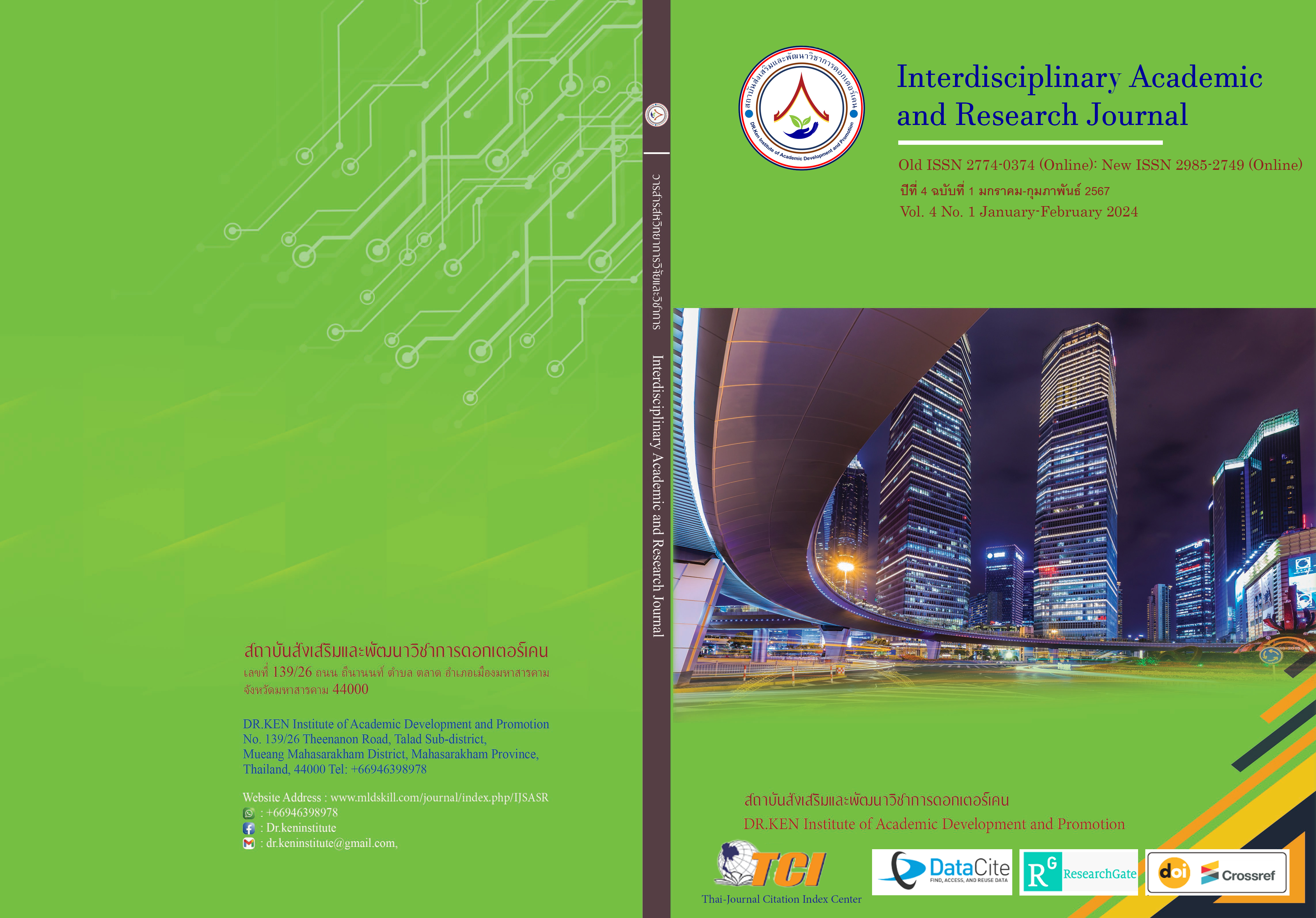Academic Leadership of Educational Institution Administrators Towards Academic Administration of Basic Educational Institutions under the Primary Educational Service Area Samutprakarn Office 1
DOI:
https://doi.org/10.60027/iarj.2024.273278Keywords:
Leadership; , Academic Leadership; , Academic AdministrationAbstract
Background and Aims: The purposes of this research are to 1) study the level of academic leadership of educational institution administrators 2) study the level of academic administration of educational institutions 3) study the academic leadership of educational institution administrators that affects administration. academics and 4) study the relationship of academic leadership among educational institution administrators.
Methodology: The population includes educational institution administrators. and teachers under the jurisdiction of the Samut Prakan Primary Educational Service Area Office, Area 1, academic year 2023, totaling 2,062 people. The sample group includes educational institution administrators and teachers, numbering 322 people, classified as educational institution administrators, numbering 16 people, and teachers, numbering 306 people, determining the sample size. Using the Krejcie & Morgan table, the sample was randomly stratified according to the size of the school. The tool used is a questionnaire that is a 5-level rating scale with a confidence value of .972. Statistics used in data analysis include percentages, means, and standard deviations. Pearson correlation coefficient and stepwise multiple regression analysis.
Results: 1) academic leadership of educational institution administrators Overall and every aspect is at a high level. 2) Academic administration of the educational institution overall and all aspects is at a high level. 3) The academic leadership of educational institution administrators towards the academic administration of basic educational institutions. There is a high level of positive correlation. It is statistically significant at the .01 level and has a correlation coefficient between (rxy=.481-.680) with statistical significance at the .01 level. 4) Academic leadership of educational institution administrators towards the academic administration of the educational institution. It was found that the variables that can predict academic administration of educational institutions Statistically significant at the .01 level include teamwork. Aspects of setting vision, mission, goals, missions, and promoting atmosphere and environment. Predictive equations can be created in the form of soil scores and standard scores as follows.
Y´ = 1.608 + .407X2 .264X4+ .261X1
Z´y= .499Zx2 + .386Zx4 + .294Zx1
Conclusion: The results of the research show that the academic leadership of school administrators is of high quality, both inclusive and in all aspects. and academic administration of educational institutions that are of high quality, both inclusive and in all aspects. The results show that academic leadership has a statistically significant relationship at the .01 level with the academic administration of educational institutions both at the school level and in various areas. In addition, it was found that some variables can Predict the academic administration of educational institutions. It has statistical significance at the .01 level, which includes teamwork. Setting the vision, mission, and goals, missions and promoting the atmosphere and environment in educational institutions. The results of this study can provide useful information in developing and improving the academic administration of the educational institution in terms of academic leadership and overall policy determination of the educational institution.
References
กระทรวงศึกษาธิการ. (2560). แผนการศึกษาแห่งชาติ พ.ศ. 2560-2579. กรุงเทพฯ: พริกหวานกราฟฟิค.
กาญจนา พิมพ์แสง (2565). ภาวะผู้นำของผู้บริหารสถานศึกษาในศตวรรษที่ 21 ที่ส่งผลต่อการบริหารงานวิชาการของสถานศึกษา สังกัดสำนักงานเขตพื้นที่การศึกษามัธยมศึกษากรุงเทพมหานครเขต 1
ชลนิชา ศิลาพงษ์. (2564). ภาวะผู้นำทางวิชาการของผู้บริหารสถานศึกษาที่ส่งผลต่อประสิทธิผลการบริหารงานวิชาการในโรงเรียน สังกัดสำนักงานเขตพื้นที่การศึกษาประถมศึกษาสกลนคร เขต 1. ปริญญาครูศาสตรมหาบัณฑิต: มหาวิทยาลัยราชภัฎสกลนคร.
ณิรดา เวชญาลักษณ์. (2564). ภาวะผู้นำ แนวคิด ทฤษฎี เพื่อการประยุกต์ใช้ทางการศึกษา. กรุงเทพฯ: วนิดาการพิมพ์.
ธีระพล บุญตาระวะ. (2563). การให้บริการประชาชนตามหลักพุทธธรรม. บัณฑิตศึกษาปริทรรศน์ วิทยาลัยสงฆ์นครสวรรค์. 8 (2),185-196.
นริศสรา บุญสอาด. (2563). ทักษะในศตวรรษที่ 21 ที่ส่งผลต่อภาวะผู้นำทางวิซาการของผู้บริหารสถานศึกษาสังกัดสำนักงานเขตพื้นที่การศึกษาประถมศึกษาสมุทรสาคร. ปริญญาศึกษาศาสตรมหาบัณฑิต: มหาวิทยาลัยศิลปากร.
บุญชม ศรีสะอาด. (2554). หลักการวิจัยเบื้องต้น. พิมพ์ครั้งที่9. กรุงเทพฯ : สุวิริยาสาส์น
ปวีณา บุทธิจักร. (2564). ภาวะผู้นำทางวิชาการของผู้บริหารสถานศึกษาที่ส่งผลต่อประสิทธิผลการบริหารงานวิชาการของโรงเรียน สังกัดสำนักงานเขตพื้นที่การศึกษามัธยมศึกษา เขต 21. ปริญญาครุศาสตรมหาบัณฑิต. สาขาวิชาการบริหารการศึกษา : มหาวิทยาลัยราชภัฎสกลนคร.
พิมพ์ใจ พุฒจัตุรัส. (2562). การบริหารงานวิชาการของโรงเรียน สังกัดสำนักงานศึกษาธิการภาค 1. ปริญญาครุศาสตรมหาบัณฑิต: มหาวิทยาลัยราชภัฎวไลยอลงกรณ์ ในพระบรมราชูปถัมภ์ จังหวัดปทุมธานี.
มานพ พันธ์พานิชย์. (2563). สภาพและแนวทางการบริหารงานวิชาการในโรงเรียนประถมศึกษา สังกัดสำนักงานเขตพื้นที่การศึกษาประถมศึกษาบุรีรัมย์ เขต 2. ปริญญาครุศาสตรมหาบัณฑิต. มหาวิทยาลัยราชภัฏบุรีรัมย์.
วริทธิ์สิน ไชยอัษฎาพร. (2565). การบริหารงานวิชาการของผู้บริหารสถานศึกษา สังกัดสำนักงานเขตพื้นที่การศึกษาประถมศึกษาสงขลา เขต 3. ปริญญาศึกษาศาสตรมหาบัณฑิต: มหาวิทยาลัยหาดใหญ่.
ศศิณัฏฐ์ ฐิติธนัตถ์. (2563). ปัจจัยที่ส่งผลต่อประสิทธิผลของการบริหารงานวิชาการโรงเรียนสารสาสนวิเทศชลบุรี. ปริญญาศึกษาศาสตรมหาบัณฑิต: มหาวิทยาลัยนอร์ทกรุงเทพ.
สรรเพชญ ไตรยงค์. (2564). ภาวะผู้นำทางวิชาการของผู้บริหารสถานศึกษา ที่ส่งผลต่อประสิทธิผลการบริหารงานวิชาการ สังกัดสำนักงานเขตพื้นที่การศึกษาประถมศึกษาบึงกาฬ. ปริญญาครุศาสตรมหาบัณฑิต สาขาวิชาการบริหารการศึกษา: มหาวิทยาลัยราชภัฏสกลนคร.
สำนักงานเขตพื้นที่การศึกษาประถมศึกษาสมุทรปราการ เขต 1. (2566). แผนพัฒนาการศึกษาขั้นพื้นฐาน ระยะ ๕ ปี (พ.ศ. ๒๕๖๖-๒๕๗๐). Retrieved from: http://samutprakan1.go.th/
สำนักงานคณะกรรมการการศึกษาขั้นพื้นฐาน. (2566). ระบบสารสนเทศเพื่อบริหารการศึกษา. Retrieved from: https://data.bopp-obec.info/emis/index_area.php?Area_CODE=1101.
สำนักงานเลขานุการของคณะกรรมการยุทธศาสตร์ชาติและสำนักงานคณะกรรมการพัฒนาเศรษฐกิจและสังคมแห่งชาติ. (2561). ยุทธศาสตร์ชาติ พ.ศ. 2561 – 2580 ฉบับประกาศราชกิจจานุเบกษา.
สุปราณี จิตรดา. (2565). การศึกษาความสัมพันธ์ระหว่างภาวะผู้นำของผู้บริหารสถานศึกษากับการบริหารงานวิชาการในสถานศึกษา สังกัดองค์กรปกครองส่วนท้องถิ่นจังหวัดชัยนาท. ปริญญาครุศาสตรมหาบัณฑิต :มหาวิทยาลัยราชภัฏนครสวรรค์.
สุภิญญา กองสวรรค์. (2564). แนวทางการบริหารงานวิชาการตามบทบาทของผู้บริหารสถานศึกษา สังกัดสำนักงานเขตพื้นที่การศึกษามัธยมศึกษา เขต 41 (พิจิตร). ปริญญาการศึกษามหาบัณฑิต: มหาวิทยาลัยนเรศวร.
อมรรัตน์ รุ่งเรือง. (2565). ความสัมพันธ์ระหว่างภาวะผู้นำของผู้บริหารกับการบริหารงานวิชาการของโรงเรียนในอำเภอ แปลงยาว สังกัดสำนักงานเขตพื้นที่การศึกษาประถมศึกษาฉะเชิงเทรา เขต 2. ปริญญาการศึกยามหาบัณฑิต. มหาวิทยาลัยบูรพา.
อัครวิชช์ เชิญทอง. (2564). การศึกษาปัญหาการบริหารงานวิชาการของโรงเรียนขนาดเล็ก สังกัดสำนักงานเขตพื้นที่การศึกษาประถมศึกษาเพชรบูรณ์ เขต 3. ปริญญาครุศาสตรมหาบัณฑิต: มหาวิทยาลัยราชภัฏนครสวรรค์.
Bafadal, I., Nurabadi, A., Sobri, A.Y., & Gunawan, I. (2019). The Competence of Beginner Principals as Instructional Leaders in Primary Schools. International Journal of Innovation, Creativity and Change. 5(4), 625-239.
Bensimon, E. M., & Neumann, A. (2017). Learning to engage: Navigating the rough waters of educational reform. Routledge.
Bolden, R., Petrov, G., & Gosling, J. (2008). Distributed leadership in higher education: Rhetoric and reality. Educational Management Administration & Leadership, 36(2), 203-220.
Bolman, L. G., & Deal, T. E. (2017). Reframing organizations: Artistry, choice, and leadership. John Wiley & Sons.
Dinham, S. (2005). "Principal Leadership for Outstanding Educational Outcomes" Journal of. Educational Administration. 43 (4): 338-356.
Fullan, M. (2014). The principal: Three keys to maximizing impact. John Wiley & Sons.
Downloads
Published
How to Cite
Issue
Section
License
Copyright (c) 2024 Yuttichai Chuakram, Suttipong Boonphadung

This work is licensed under a Creative Commons Attribution-NonCommercial-NoDerivatives 4.0 International License.
Copyright on any article in the Interdisciplinary Academic and Research Journal is retained by the author(s) under the under the Creative Commons Attribution-NonCommercial-NoDerivatives 4.0 International License. Permission to use text, content, images, etc. of publication. Any user to read, download, copy, distribute, print, search, or link to the full texts of articles, crawl them for indexing, pass them as data to software, or use them for any other lawful purpose. But do not use it for commercial use or with the intent to benefit any business.
















.png)


